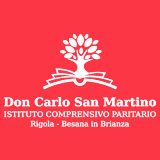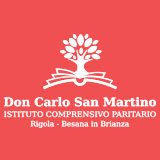At the first stage of the Secondary school tweens grow through self-awareness and confrontation with the others, recognise their potential, develop their attitudes and orient themselves to build their own personal life project.
The first stage of the Secondary school is where the boy or girl starts to understand their inclinations, preferences and aptitudes: teachers at Rigola pay great attention to observing each single individual, in order to lead them through the very important choice of a path which will be the base for their future – both professional and human.
In the first stage of the Secondary school kids have access to the disciplines as points of view on reality and a way to learn, interpret and represent the world. They get to explore complex issues and organise knowledge in the perspective of a knowledge which will gradually become integrated and mastered.
PROJECTS AND DIDACTIC ACTIVITIES AT THE SECONDARY SCHOOL
The pedagogical tool underlying the didactic activities at the first stage of the Secondary school is the curriculum – the whole activities composing the school journey of a student. At Rigola such itinerary is progressive and continuous, starting at the Kindergarten and reaching its peak with the first stage of the Secondary school.
As per the primary, Rigola proposes at the secondary school interdisciplinary projects which are part of the enrichment in the educational offer. The curricular labs and activities proposed by the Institute offer experiential approaches (learning by doing) – this anyway by conceptualising the new experiences through critical thinking.
Labs for enhancing the English language thanks to labs carried out by mothertongue teachers help students acquire self-confidence and reinforce their language and communicative skills.
Music labs involve the tween in a pathway made of chants, improvisation and rhythmic play, enabling them to develop their attitudes.
Theatre labs offer the chance of personal growth and self-knowledge.
In order to grant educational and didactic continuum between school grades the Institute promotes curricular vertically orientation aiming at the gradual and harmonic development of knowledge, competences and skills. We offer learning environments which are places for experience and practical knowledge: vertical curricula, labs for the Kindergarten, interdisciplinary and continuity projects, opening and interaction with the territory and the institutions, orientation meant as a ‘compass’ to accompany children, kids and families throughout all stages of growth.
PRE- AND POST-SCHOOL: to help working parents children can arrive at school at 7:30 and stay there until 18:00
CANTEEN: a service directly managed by the qualified school personnel
BUS: service covering the whole territory surrounding the school
Children can benefit from the post-school service from 16:00 to 18:00. In these hours an educator leads the kids through playful, creative activities.
ORGANISATION OF THE ACTIVITIES
The school proposes its activities from Monday to Friday, from 8:00 to 14:00.
Schools recognised by the state are the public schools recognised by the Ministry of Education according to the law n. 62 of year 2000.
The school manages the didactic and educational orientation project in full autonomy but respecting the ministerial normative.
Teachers are thoroughly chosen by the School Director and supported to favour the pedagogical continuum.
Classes are composed of few students so that all can be individually looked after and valued in their school path.
By enrolling their children to the school, families are part of the school community. Families have an essential role in the realization of the school’s educational project and commit themselves to promote the observance of the set of rules aimed at a correct unfolding of the didactic and educational activities. A serene environment of trust and cooperation can’t but favour the educational action of the school.
Enrolment occurs through a first contact with the secretariat to show interest, then a meeting with the school director will allow you to learn about the educational offer, the services, customise the pathways discussed upon with the parent and visit the school. The meeting ends with a formal commitment of the parent to enrol the child in the structure.
Dote Scuola is the financial contribution foreseen by Regione Lombardia to support the families and the educational path of children from 3 to 21 years for merit, school voucher, purchasing material, supporting disabled students.
Dote Scuola funds are destined to students residing in Lombardy and attending public bodies or schools recognised by the state. The contribution supports families in the free choice to orient their children to a non-public school.
Every year Regione Lombardia approves the contributions. Detailed information are to be found on www.regionelombardia.it.
THE HISTORY
Rigola, today a comprehensive institute recognised by the Italian state and composed of a Toddlers’ section, Kindergarten, Primary school and first stage of Secondary school, looks back on a long and fascinating history.
In 1885 don Carlo San Martino founded in Milan the Pio Istituto pei Figli della Provvidenza, aiming at building a serene and welcoming environment for young people in difficulty.
THE SETTING
The location, whose original body dates back to the 17th century, is surrounded by an exquisite Italian-style garden and disposes of ample external and indoor spaces: courtyards for outdoor play, salons for breaks, dining rooms, a theatre, a gym, reading halls, multimedial classrooms, science, art and language labs and a chapel. In the park we can find the old oratory of Madonna della Neve.
‘Don’t you realise, Sir – I’m twelve and I haven’t concluded anything yet’
Daniel Pennac


